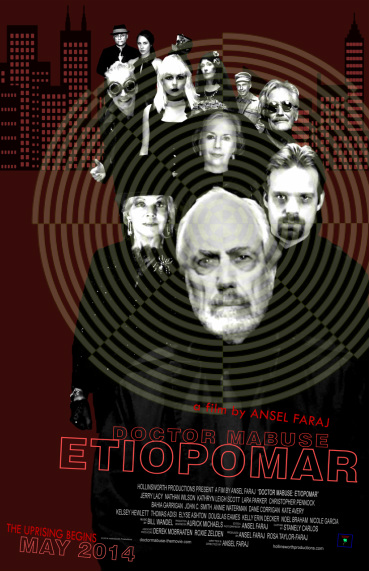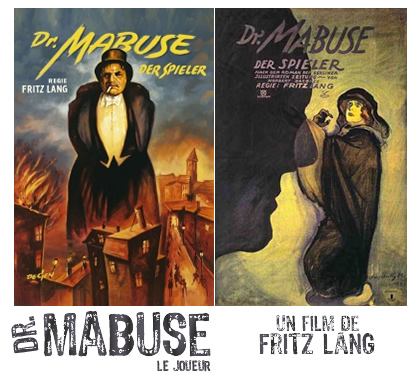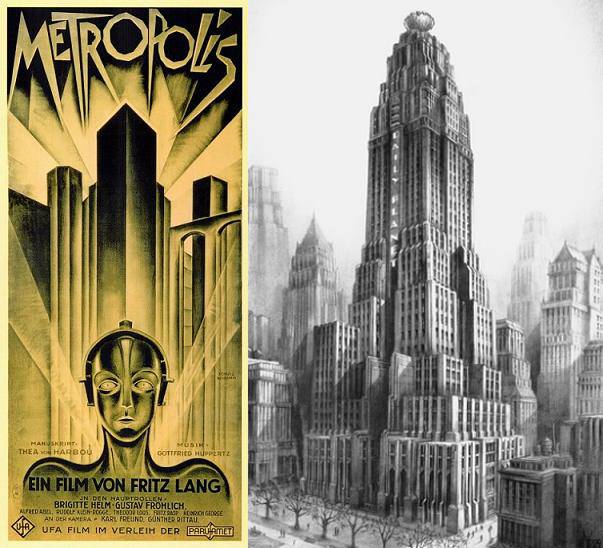The Resurrection of Dr. Mabuse, Part Two

 Less than six months ago, I reviewed indie wunderkind Ansel Faraj’s 21st Century update of Dr. Mabuse. The Rondo-nominated film garnered more attention from genre fans for Faraj’s stunt casting of veterans of the 1960s Gothic soap opera Dark Shadows than it did for his faithful recreation of Expressionism in the digital age of indie filmmaking.
Less than six months ago, I reviewed indie wunderkind Ansel Faraj’s 21st Century update of Dr. Mabuse. The Rondo-nominated film garnered more attention from genre fans for Faraj’s stunt casting of veterans of the 1960s Gothic soap opera Dark Shadows than it did for his faithful recreation of Expressionism in the digital age of indie filmmaking.
I won’t claim Faraj is the equal of Fritz Lang or that his Hollinsworth Productions offers the resources of UFA at its peak, but this is a young man who impresses in spite of the limitations of budget and time. There is a dreamlike quality to his work which is helped rather than hindered by the Spartan production values. One wonders just what he would be capable of rendering given studio backing.
Faraj’s latest production, Etiopomar, is the second half of his Dr. Mabuse reboot and deftly blends elements of Norbert Jacques’s original novel that Fritz Lang and his screenwriter wife Thea Von Harbou jettisoned from their 5-hour two-part adaptation of the book in 1922, while incorporating characters from Lang and Von Harbou’s Metropolis (1927). When one considers Lang’s silent masterpieces, the visionary Metropolis easily supersedes his Mabuse pictures. Metropolis is a stunning sci-fi epic that is still influential nearly 90 years on.
An interesting aside for movie buffs is that German actor Rudolf Klein-Rogge (who was cinema’s original Dr. Mabuse) went on to play the mad scientist Rotwang in Metropolis. This fact is made even more interesting when one considers the fact that Klein-Rogge was also Thea Von Harbou’s ex-husband. Somehow, Faraj’s decision to incorporate Rotwang and his alluring android Maria into his Mabuse sequel makes sense in light of this knowledge.

 Of course, Faraj has set his aims far higher than mere in-jokes for movie buffs. Much of Etiopomar concerns mythology and mankind’s need for myths. Cinema has become the latest expression of mythology in world culture and the mythic belief that the dystopian nightmare of Etiopomar can find salvation as the utopia of Mabuse and Rotwang’s mad dreams is the central theme of this new film. Faraj’s dialogue and story point to the filmmaker’s need to constantly rework the past in mining the truth and reflects mankind’s unceasing desire to find new relevance in fairy tales.
Of course, Faraj has set his aims far higher than mere in-jokes for movie buffs. Much of Etiopomar concerns mythology and mankind’s need for myths. Cinema has become the latest expression of mythology in world culture and the mythic belief that the dystopian nightmare of Etiopomar can find salvation as the utopia of Mabuse and Rotwang’s mad dreams is the central theme of this new film. Faraj’s dialogue and story point to the filmmaker’s need to constantly rework the past in mining the truth and reflects mankind’s unceasing desire to find new relevance in fairy tales.
A tremendous part of the first film’s success was down to Dark Shadows co-star Jerry Lacy in the title role. Those who have seen the first half are aware that Lacy relinquished the role to Nathan Wilson, who played Inspector Lohmann (a character introduced in Fritz Lang’s dark masterpiece, M (1931), who subsequently made an unlikely transition into the Mabuse series). Lohmann’s possession by Mabuse was in keeping with the original series’s exploration of the blurring of the line separating sanity and the supernatural. Viewers anticipating a traditional ending of good overcoming evil are misjudging Faraj and his worldview.
Two points to anyone who spots the in-joke reference to Gordon Hessler’s cult classic, Scream and Scream Again (1969), and understands its significance to the world of Mabuse. Faraj’s understanding of the genre’s tropes only adds to the viewer’s enjoyment and leaves one wondering if the similarities with Alan Moore’s League of Extraordinary Gentlemen graphic novels, which also draw upon mythology and pop culture (including both Mabuse and Metropolis, among Fritz Lang’s work) are deliberate or coincidental.
Ultimately, it is immaterial. What is consequential is that Faraj’s low-budget masterpieces are sheer delight for genre fans who view them as either contemporary standalone efforts or affectionate tributes to seminal works that have been absorbed into pop culture long after mainstream audiences have lost all connection with their origin. Etiopomar is a nightmare that genre fans will savor. Etiopomar is well worth checking out on Video on Demand. Find out more at http://www.doctormabuse-themovie.com/
William Patrick Maynard was authorized to continue Sax Rohmer’s Fu Manchu thrillers beginning with The Terror of Fu Manchu (2009; Black Coat Press) and The Destiny of Fu Manchu (2012; Black Coat Press). The Triumph of Fu Manchu is scheduled for publication in July 2014.